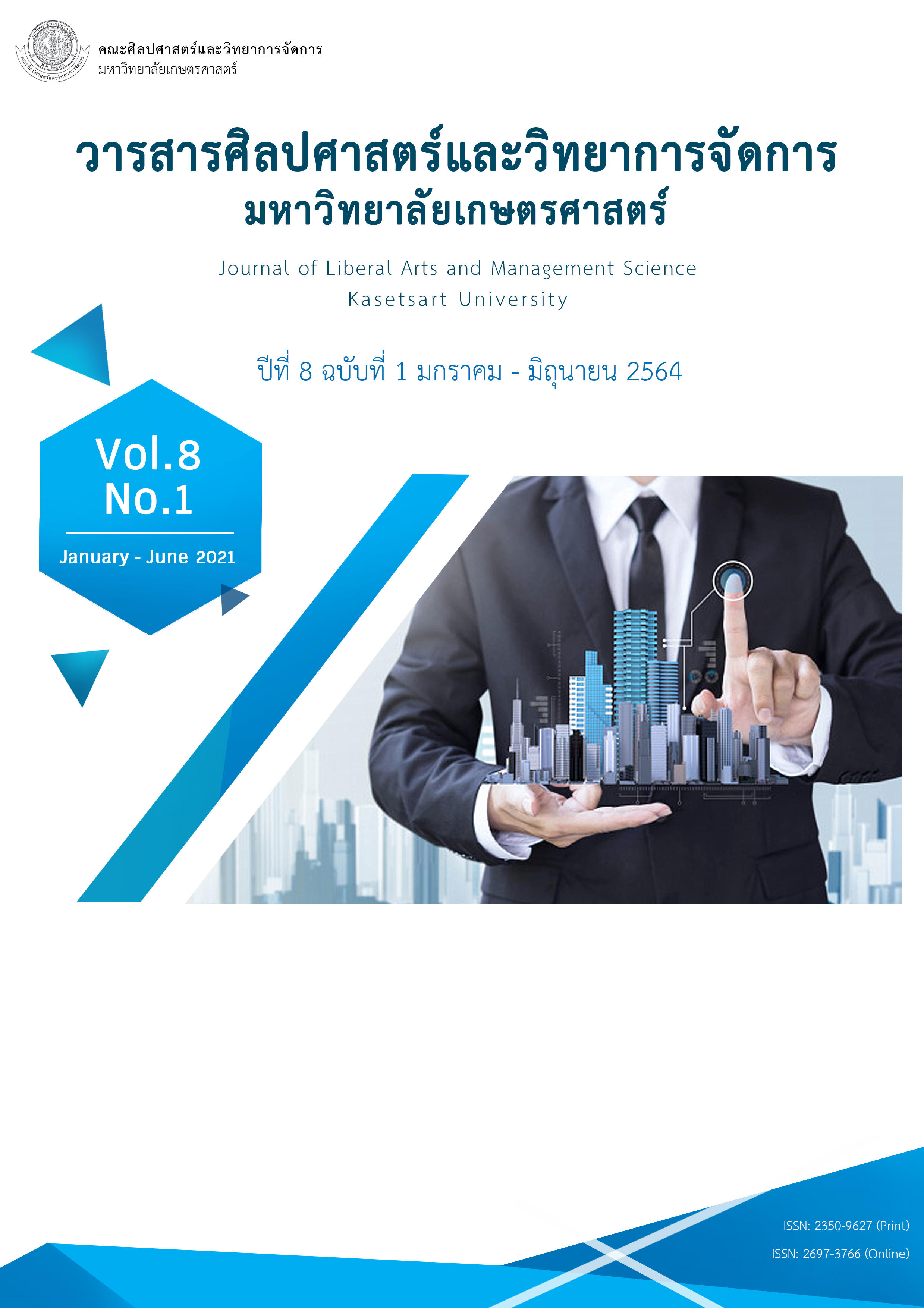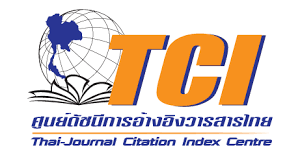อิทธิพลของการมุ่งเน้นการตลาดและการมุ่งเน้นความเป็นผู้ประกอบการ ที่มีผลต่อความสามารถทางนวัตกรรมผลิตภัณฑ์และผลการดำเนินงานทางการตลาด
คำสำคัญ:
การมุ่งเน้นการตลาด, การมุ่งเน้นความเป็นผู้ประกอบการ, ความสามารถนวัตกรรมผลิตภัณฑ์, ผลการดำเนินงานทางการตลาดบทคัดย่อ
การวิจัยนี้มีวัตถุประสงค์เพื่อตรวจสอบอิทธิพลของการมุ่งเน้นการตลาดและการมุ่งเน้นความเป็นผู้ประกอบการที่มีอิทธิพลต่อความสามารถนวัตกรรมผลิตภัณฑ์และนำไปสู่ผลการดำเนินงานทางการตลาด การวิจัยนี้ใช้การวิเคราะห์การถดถอยเชิงพหุคูณในการวิเคราะห์ความสัมพันธ์ระหว่างตัวแปรกลุ่มตัวอย่างที่ใช้ศึกษาคือวิสาหกิจขนาดกลางและขนาดย่อม (SMEs) จำนวน 259 ราย ในอำเภอเมือง จังหวัดนครราชสีมา ผลการทดสอบสมมติฐานพบว่า การมุ่งเน้นด้านการตลาด (การมุ่งเน้นลูกค้า, การมุ่งเน้นคู่แข่งขันและการมุ่งเน้นประสานความร่วมมือภายใน) และการมุ่งเน้นความเป็นผู้ประกอบการ มีอิทธิพลสำคัญและส่งผลทิศทางเชิงบวกต่อความสามารถนวัตกรรมผลิตภัณฑ์ ในทำนองเดียวกันความสามารถ นวัตกรรมผลิตภัณฑ์นำไปสู่ผลการดำเนินงานทางการตลาด การศึกษานี้เป็นการยืนยันถึงความสำคัญของการมุ่งเน้นการตลาด และการมุ่งเน้นความเป็นผู้ประกอบการว่าเป็นทรัพยากรภายในองค์กรที่สามารถสร้างความได้เปรียบทางการแข่งขันสอดคล้องกับทฤษฎีฐานทรัพยากร และนำมาซึ่งการบรรลุความสำเร็จในการดำเนินงานขององค์กรได้ในที่สุด
เอกสารอ้างอิง
กฤศกร จิรภานุเมศ สมนึก เอื้อจิระพงษ์พันธ์ และพนิดา แช่มช้าง. (2554). ผลของการมุ่งเน้นความเป็นผู้ประกอบการและกลยุทธ์ที่มีต่อความสามารถทางนวัตกรรมและผลการดำเนินงาน การศึกษาเชิงประจักษ์ของบริษัทที่จดทะเบียนในตลาดหลักทรัพย์ เอ็ม เอ ไอ. วารสารวิทยาการจัดการ, 28(1), 1-15.
เกียรติศักดิ์ รุจิระธนลักษณ์ แคทลียา ชาปะวัง และภูริศร์ พงษ์เพียจันทร์. (2560). ผลกระทบการสร้างสรรค์นวัตกรรมการตลาดที่มีต่อความได้เปรียบการแข่งขันของธุรกิจการผลิตชิ้นส่วนและอุปกรณ์ประกอบ. วารสารการบัญชีและการจัดการ มหาวิทยาลัยมหาสารคาม, 9(2), 171-182.
กัสมา กาซ้อน, ธีรศักดิ์ กัญจนพงศ์ และนพพร ศรีวรวิไล. (2014). ผลกระทบของพฤติกรรมมุ่งตลาดและพฤติกรรมมุ่งการเรียนรู้ที่มีต่อความสามารถด้านการแข่งขันของอุตสาหกรรมยานยนต์ไทย. วารสารสุทธิปริทัศน์, 28, 85(1), 118-144.
ปรารถนา หลีกภัย และเกิดศิริ เจริญวิศาล. (2555). ผลของการมุ่งเน้นความเป็นผู้ประกอบการ การมุ่งเน้นตลาด และการมุ่งเน้นการเรียนรู้ ที่มีต่อความสามารถทางนวัตกรรมองค์กร. วารสารวิทยาการจัดการ, 29(1), 77-90.
วัชรพันธ์ ผาสุข. (2558). การมุ่งเน้นตลาดและการมุ่งเน้นการเรียนรู้ในการพัฒนาความสามารถทางนวัตกรรมและผลการดำเนินงานของธุรกิจอุตสาหกรรมขนาดกลาง. วารสารการจัดการภาครัฐและภาคเอกชน, 102-126.
วิภาวี เนาวรังษี. (2557). การศึกษาผลการมุ่งเน้นการตลาดที่มีต่อผลการดำเนินงานธนาคารออมสินภาค 13. การศึกษาค้นคว้าอิสระหลักสูตรบริหารธุรกิจมหาบัณฑิต. คณะบริหารธุรกิจ, มหาวิทยาลัยเทคโนโลยีราชมงคลอีสาน.
สุธาทิพย์ จันทร์เจริญผล และวิโรจน์ เจษฎาลักษณ์. (2558). อิทธิพลของการมุ่งเน้นความเป็นผู้ประกอบการและการมุ่งเน้นการตลาดที่มีต่อการตอบรับจากลูกค้าและความได้เปรียบทางการแข่งขันของกิจการร้านยาในจังหวัดนครปฐม. Veridian E-Journal สาขามนุษยศาสตร์ สังคมศาสตร์ และศิลปะ, ปีที่ 8 ฉบับที่ 1, 1176-1191.
สรวิศ ปิ่นรัตนานนท์. (2555). ความได้เปรียบทางการแข่งขันและความสามารถของผู้ประกอบการต่อความสำเร็จทางการตลาดธุรกิจการท่องเที่ยวของประเทศไทย. วิทยานิพนธ์หลักสูตรบริหารธุรกิจมหาบัณฑิต. คณะบริหารธุรกิจ. มหาวิทยาลัยเทคโนโลยีราชมงคลอีสาน.
สุวิมล ติรกานันท์. (2555). ระเบียบวิธีการวิจัยทางสังคมศาสตร์: แนวทางสู่การปฎิบัติ. กรุงเทพ: จุฬาลงกรณ์มหาวิทยาลัย.
สำนักงานส่งเสริมวิสาหกิจขนาดกลางและขนาดย่อม. (2560). SMEs กับเศรษฐกิจของประเทศ. (Retrived 2560 มิถุนายน) อ้างอิงได้จาก: www.sme.go.th/SiteCollectionDocuments/
อนุวัต สงสม. (2562). ผลของความสามารถทางนวัตกรรมที่มีต่อความได้เปรียบทางการแข่งขันสำหรับวิสาหกิจขนาดกลางและขนาดย่อมในจังหวัดสงขลา. Veridian E-Journal Humanities Social Sciences and Arts, 12(3), 821-835.
Adam, M., & Tabrani, M. (2016). The Impact of Market Orientation, Brand Image and Internal Marketing on Brand Orientation and Strengthening Br. In Proceedings of International Academic Conferences (No. 4106682). International Institute of Social and Economic Sciences.
Al-Matari, E.M., Al-Swidi, A.K. & Bt Fadzil, F.H. (2014). The Measurements of Firm Performance’s Dimensions. Asian Journal of Finance & Accounting, 6(1), 24-49.
Andaç, A., Akbiyuk, F., & Karkar, A. (2016). Customer satisfaction factor in digital content marketing: Isparta Province as an example. International Journal of Social Science Studies, 4(5), 124-135.
Barney, J. (1991). Firm resources and sustained competitive advantage. Journal of Management. 17(1), 99-120.
Engin, D. E., & Omur, N. T. O. (2012). The effect of market orientation, learning orientation and innovativeness on firm performance: A research from Turkish logistic sector. International Journal of Economic Science and Applied Research, 5(1), 77-108.
Goedhuys, M., & Veugelers, R. (2012). Innovation strategies, process and product innovations and growth: Firm-level evidence from Brazil. Structural Change and Economic Dynamics, 23(4), 516-529.
Gunday, G., Ulusoya, G., Kilica, K., & Alpkan, K. (2011). Effects of innovation types on firm performance. International Journal of Production Economics, 133(2), 662–676.
Hair, Jr.J.F., Babin, B.J., & Anderson, R.E. (2010). Multivariate data analysis: A global perspective 7th Ed. New Jersey: Pearson Prentice Hall.
He, H., & Harris, L. (2020). The impact of Covid-19 pandemic on corporate social responsibility and marketing philosophy. Journal of Business Research, 116: 176-182.
Lamberton, C., & Stephen, A. T. (2016). A Thematic Exploration of Digital, Social Media, and Mobile Marketing: Research Evolution from 2000 to 2015 and an Agenda for Future Inquiry. Journal of Marketing: AMA/MSI Special Issue, 80, 146-172.
Lee, Y.K., Kim, S.H., Seo, M.K., & Hight, S.K. (2015). Market orientation and business performance: Evidence from franchising industry. International Journal of Hospitality Management, 44, 28-37.
Lun, Y. V., Shang, K. C., Lai, K. H., & Cheng, T. C. E. (2016). Examining the influence of organizational capability in innovative business operations and the mediation of profitability on customer satisfaction: An application in intermodal transport operators in Taiwan. International Journal of Production Economics, 171, 179-188.
Narver, J. C., & Slater, S. F. (1990). The effect of a market orientation on business profitability. Journal of Marketing, 54(4), 20-35.
Patrutiu-Baltes, L. (2016). The Impact of Digitalization on Business Communication. SEA–Practical Application of Science, 4(11), 319-325.
Rhee, J., Park, T., & Lee, D.H. (2010). Drivers of innovativeness and performance for innovative SMEs in South Korea: Mediation of learning orientation. Technovation, 30, 65-75.
Santos, J. B., & Brito, L. A. (2012). Towards a Subjective Measurement Model for Firm Performance. Brazilian Administration Review, 9, 95-117.
Schueffel, P. (2014). The effects of entrepreneurial orientation on innovation performance, open innovation proclivity and openness. In 2014 Annual Meeting of the Academy of Management, 1-28.
Suliyanto, S., & Rahab, R. (2012). The role of market orientation and learning orientation in improving innovativeness and performance of small and medium enterprises. Asian Social Science, 8(1), 134.Vora-Sittha, P. (2012). Governance and poverty reduction in Thailand. Modern Economy, 3(5), 487-497






